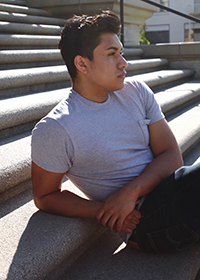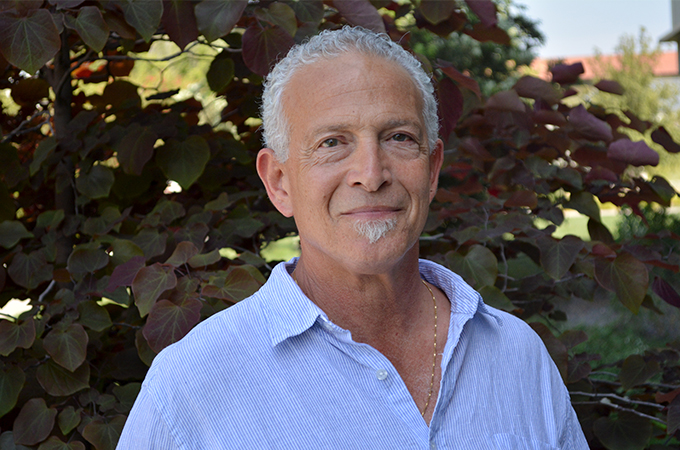The last time I spoke with Ralph Angel must have been in April 2019. I was turning in a final to the Creative Writing office a few days before summer break was set to begin. It would be six months before either of us would be back at Redlands.

I was leaving for a semester abroad in London, and he, my faculty advisor, was going on sabbatical. Our conversation centered on the advice he had for me regarding London. He went on about it in the way Ralph would go on about things, putting his hand on his chest and smiling up at the ceiling as he spoke.
I took from the conversation an understanding that I should temper my expectations for the food and heighten my expectations for young Londoners at the pubs. He also spoke highly of the English poetry scene and predicted I’d enjoy visiting Amsterdam.
Each prediction ended up ringing true. Oddly enough, I never wrote his words of advice down. Ralph had a knack for getting his long and descriptive style of speaking to stick in your head, a useful tool for a poet and professor.
I’ve always struggled with paying attention in class. I’ve been on the receiving end of the “yo fool, you clearly aren’t paying attention” statement from teachers since I first sat in a desk. I can’t help my daydreaming, looking up at the ceiling as sound flies far beneath where my attention is seated.
When Ralph addressed his classes he often appeared bemused as he spoke, curating a great deal of care and thoughtfulness into his sentences. Typically he was seated, with eyes trained upwards towards the sky rather than at the students he was speaking to. Perhaps our daydreams sometimes ran into each other. Hung up in the air was that colorful, significant nothing that drew our attention so frequently.
Whatever it was, I like to think we looked up at the same thing. His writing lessons fell down from there and landed on my head like Newton and an apple.
I took two classes with my advisor in back-to-back semesters during my sophomore year. Over that period, I kept a list of my favorite in-class Ralph quotes, assembled over months of quick scribbling. I read up on them now and think about how differently I approach writing after my time learning from Ralph.
“We spend our whole lives hiding who we are and then ask ourselves to becomes artists.”
I came to the University of Redlands with a creative writing scholarship but without the faintest clue about how to actually write. I intended to declare a poetry emphasis. However, at the time, I didn’t understand basic terminology within poetry. Most of my education came from performing at open mics and watching spoken word shows in the Inland Empire. I listened to how the poets and rappers spit their flow and structured my writing based on where a rhyme was located.
The result was extremely choppy writing without a coherent feeling. No one could make sense of it as poetry unless I read it aloud. If I wanted to rhyme a few words in succession, which happened a lot, it would look like “No fans/best plans/are rhyme schemes/dreams/seem/like beams of light.” (Actual poem taken from 2017 Puma. I cringe when I read it, but honestly, the rhymes could look good if rewritten thoroughly and used in different work. I LOVE when research for one thing yields results for another.)
Despite the obvious shortcomings of my words on the page, I prided in myself on my performance of these unreadable pages. It was my way of building confidence, constructing sandcastles out of unorganized, oversized pebbles. I’d often get a fair amount of snaps and claps when I performed. I soon was introduced warmly by hosts at the joints I frequented. It definitely went to my head.
In early writing classes, my ego didn’t allow me to learn. In my poetry workshop, I was told to try maybe and rhyme less, as my poems were devoid of most qualities other than rhyme. I didn’t take the advice and did what I felt like doing. (To think I called myself humble.)
I was such a kid, self-conscious to the bone without enough backbone to write about my ebbs and flaws. I’d measure myself against all those cocky dormmates who swore they’d be making bank in their majors. My first lesson was to forget about “me” for “me” to show up in my writing. Behind my reckless and nonchalant demeanor lay a fear of inadequacy, with which I wasn’t equipped to deal with, let alone write about. I still struggle, but at least now I can write about it.
“I think the risk, in all art, is dropping the veil. It’s too risky, it’s too embarrassing, why would anyone be an artist? But that’s your job.”
“If we don’t believe the addressee, if we don’t believe the voice, then the poem sinks.”
Ralph would trick you into thinking he had an ego. I believe all artists need one, as the profession brings rigorous competition and a condescending disrespect from those in other fields. Ralph would mention his agent, his studio in Los Angeles, and traveling the country and world to read his work. However, this never slipped into the discussion of poetry. He smiled with his whole face when someone would recite and seemed to take particular pride when a student showed improvement.
From this, I learned it was possible to balance self-confidence and selflessness within the world of creativity. In fact, it’s necessary. He was ecstatic to discuss the simplest of details with students wetting their feet into waters of poetry he‘d lived in for decades. I learned that to properly write a poem, you must first properly read and listen to them. Once you pay enough attention to poetry, it becomes easy to find beauty in every piece.
Poems are like fingerprints, and even someone just starting is spectacularly unique. I learned to find the details only I knew to look for. Within this lies the art form. In the past, I was creating as a way to sound cool to an audience, gearing words towards what I thought people wanted to hear. A voice needs to be original in what it dares to risk to be authentic. I began working subjects I was afraid to speak of into my pieces. Taking stances and believing in them. At times they didn’t work and came off awkwardly, meaning I finally was learning to be a writer.
“I’m a fucking poet.”
“Poetry is the language for which we have no language... .” To elaborate on this quote as Ralph often would: Poetry is the feeling moments before the first tear rolls down your face. It’s a fist-clenching before punches are even a thought; the language our emotions are naturally fluent in. Ralph would often impart sayings like this in his one-on-one meetings. An indirect way of helping me reach the heart of a piece. He’d offer to read my pieces even when they weren’t for a class. During class, he’d challenge me when I wasn’t giving full effort. I appreciated it because he always believed in me. I took it as a sign of encouragement and a desire to see me grow. I still have that Ralph in the back of my head whenever I write, always asking, “Is this honest enough? Is this pushing my vocabulary? Does this piece have every bit of desire it deserves?” One memorable lecture at the end of a semester had Ralph laying into the whole class for not taking a poem seriously enough.
“You think it’s always going to be easy?” he said loudly, totally out of character. “You have to be willing to sacrifice for your art. You need to want this thing with your life!”
I enjoyed the realness he displayed. It was good for me. I needed to own myself. From Ralph, I learned to say, “I am a poet.” To love it. Breathe it in. Say it with ya chest, poet.
We parted that day in April with a few heartfelt thank yous and hope you have a great next semesters before I walked down the Hall of Letters. I remember feeling like I could have said a better goodbye. I rationalized it: I was only a sophomore, dude was my advisor, I thought I’d see him again. Long goodbyes are for seniors. I was sure I’d give a proper goodbye and thank you when my time to graduate came.
I didn’t get a chance to see him this semester as I wasn’t taking his class, and my schedule conflicted with his office hours. I had planned to ask him to tutor me on writing lyric and jazz poetry. In all honesty, I didn’t write anything new for a few weeks after learning of his passing. It affected me creatively more than I let on or allowed myself to admit.
I do find great solace remembering our last class session because I read my compilation of Ralph quotes aloud as part of a final portfolio. It sounded like a fun thing to do, although I felt like an absolute teacher’s pet at the time. I’m now extremely happy with my decision. At least he knew I was listening. I planned to, if people were sharing, read the quotes at the on-campus memorial with some kind of poem. Perhaps he is finally able to look down from the ceilings we would always stare up at. Maybe he never saw the ceiling, instead choosing to gaze through it at the never-ending universe residing above it. For those eyes which wander upwards, may they find the creative place he did.
P.S.
(Below is my list of Ralph quotes)
“Why would you do what someone tells you, just because they told you to do it. Why not always do what you need to do?”
“What we’ve been taught in life about winning and losing, it has very little to do with art.”
“There is no “you” without an “I.”
“Every time you break a line, you are orchestrating music. You are orchestrating sound.”
“Let’s be honest. You’re all tired and weird.” Damn
(About poetry) “We spend countless hours figuring out what it means. I’m more worried about the experience.”
“If you name the city, you go there, even if you’ve never been there before.
(On getting specific)
“If you got specific, everyone would still relate.”
“If you can’t get specific, you can’t be an artist.”
“We spend our whole lives hiding who we are and then ask ourselves to becomes artists.”
“Maybe everything is a love poem.”
See also “In memoriam: Ralph Angel (1951-2020).”






